Cambodia PM launches project linking Mekong river to sea via canal
Suy SE
Sun, 4 August 2024
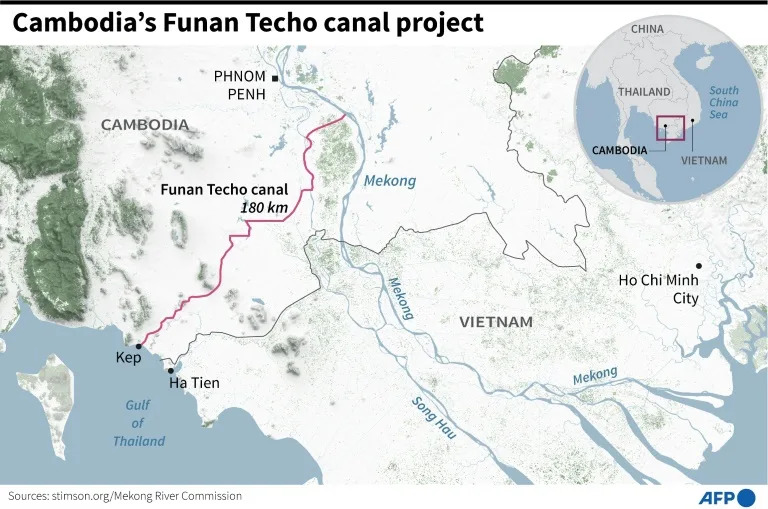
Map showing the projected route of the Funan Techo canal in southern Cambodia. (John SAEKI)
Cambodia's Prime Minister Hun Manet on Monday launched a controversial $1.7 billion canal project that aims to provide a new link from the Mekong River to the sea.
At a launch event in Prek Takeo, southeast of the capital Phnom Penh, Manet called the 180-kilometre (110-mile) project "historic", as fireworks shot into the air and drums sounded.
"We must build this canal at all costs," he said.
Once completed, the Funan Techo canal will run from a spot on the Mekong river, about an hour's drive southeast of Phnom Penh, to the sea in the Gulf of Thailand.
But the project comes shrouded in uncertainty, including its main purpose -- whether for shipping or irrigation -- who will fund it, and how it will affect the flow of the Mekong -- one of the world's longest rivers.
Conservationists have long warned that the river, which supports up to a quarter of the world's freshwater fish catch and half of Vietnam's rice production, is at risk from infrastructure projects, pollution, sand mining, and climate change.
Cambodia, Laos, Vietnam, and Thailand are signatories to the 1995 Mekong River Agreement, which governs the distribution of the river's resources.
Cambodia has notified the Mekong River Commission (MRC) of its plans for the canal, but Vietnam wants more information about the project.
- 'Nose to breath through' -
Phnom Penh argues the project affects only a Mekong tributary and therefore requires only the notification it has already submitted.
The canal, one of former prime minister Hun Sun's signature infrastructure projects, is seen as a galvanising national undertaking to build support for his successor and son, Hun Manet.
Hun Sen, who ruled Cambodia for over three decades and who celebrated his birthday on Monday, has described the canal as giving the country a "nose to breathe through".
The government says the project will offer an alternative for container ships that currently cross into Vietnam before heading to the sea, allowing Cambodia to keep transport revenue in-country.
It says it is planning riverside economic zones along the route that it says could create tens of thousands of jobs for the country, which is among the poorest in Southeast Asia.
Last year, the China Road and Bridge Corporation (CRBC), a Chinese construction giant that has financed other infrastructure in Cambodia, agreed to a feasibility study of the project.
Cambodian officials have suggested the Chinese state-owned company could finance part of the canal, but CRBC has not released its study or made any public commitment.
While Cambodia is a close ally of Beijing, Hun Sen has denied the canal will be part of China's Belt and Road infrastructure plan.
suy-sah/srg/fox
Sun, 4 August 2024

Map showing the projected route of the Funan Techo canal in southern Cambodia. (John SAEKI)
Cambodia's Prime Minister Hun Manet on Monday launched a controversial $1.7 billion canal project that aims to provide a new link from the Mekong River to the sea.
At a launch event in Prek Takeo, southeast of the capital Phnom Penh, Manet called the 180-kilometre (110-mile) project "historic", as fireworks shot into the air and drums sounded.
"We must build this canal at all costs," he said.
Once completed, the Funan Techo canal will run from a spot on the Mekong river, about an hour's drive southeast of Phnom Penh, to the sea in the Gulf of Thailand.
But the project comes shrouded in uncertainty, including its main purpose -- whether for shipping or irrigation -- who will fund it, and how it will affect the flow of the Mekong -- one of the world's longest rivers.
Conservationists have long warned that the river, which supports up to a quarter of the world's freshwater fish catch and half of Vietnam's rice production, is at risk from infrastructure projects, pollution, sand mining, and climate change.
Cambodia, Laos, Vietnam, and Thailand are signatories to the 1995 Mekong River Agreement, which governs the distribution of the river's resources.
Cambodia has notified the Mekong River Commission (MRC) of its plans for the canal, but Vietnam wants more information about the project.
- 'Nose to breath through' -
Phnom Penh argues the project affects only a Mekong tributary and therefore requires only the notification it has already submitted.
The canal, one of former prime minister Hun Sun's signature infrastructure projects, is seen as a galvanising national undertaking to build support for his successor and son, Hun Manet.
Hun Sen, who ruled Cambodia for over three decades and who celebrated his birthday on Monday, has described the canal as giving the country a "nose to breathe through".
The government says the project will offer an alternative for container ships that currently cross into Vietnam before heading to the sea, allowing Cambodia to keep transport revenue in-country.
It says it is planning riverside economic zones along the route that it says could create tens of thousands of jobs for the country, which is among the poorest in Southeast Asia.
Last year, the China Road and Bridge Corporation (CRBC), a Chinese construction giant that has financed other infrastructure in Cambodia, agreed to a feasibility study of the project.
Cambodian officials have suggested the Chinese state-owned company could finance part of the canal, but CRBC has not released its study or made any public commitment.
While Cambodia is a close ally of Beijing, Hun Sen has denied the canal will be part of China's Belt and Road infrastructure plan.
suy-sah/srg/fox
Cambodia breaks ground on China-funded canal and says it will be built 'no matter the cost'
SOPHENG CHEANG and ANIRUDDHA GHOSAL
Mon, August 5, 2024
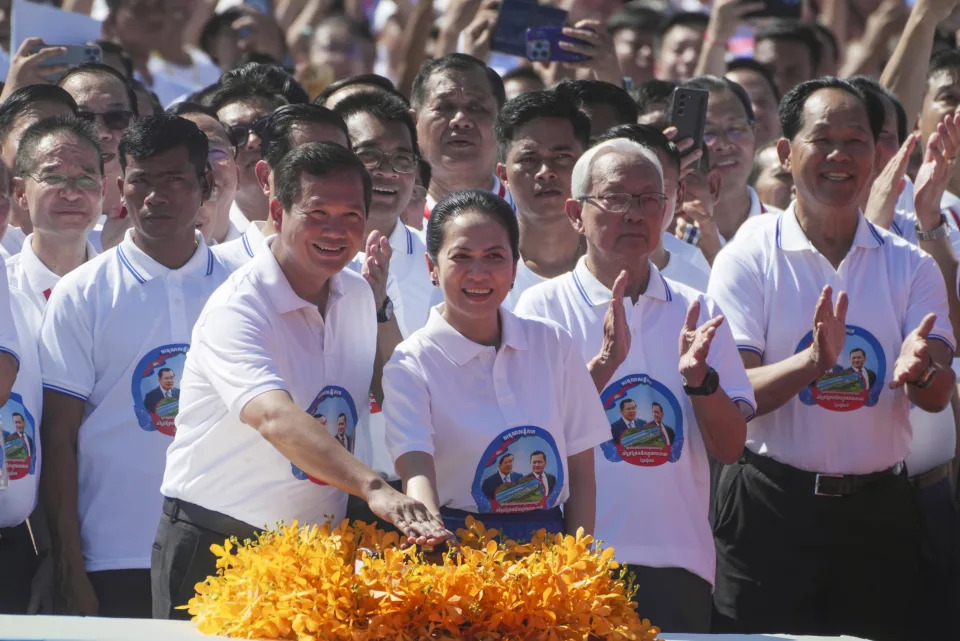
AFP
Sun, August 4, 2024 a
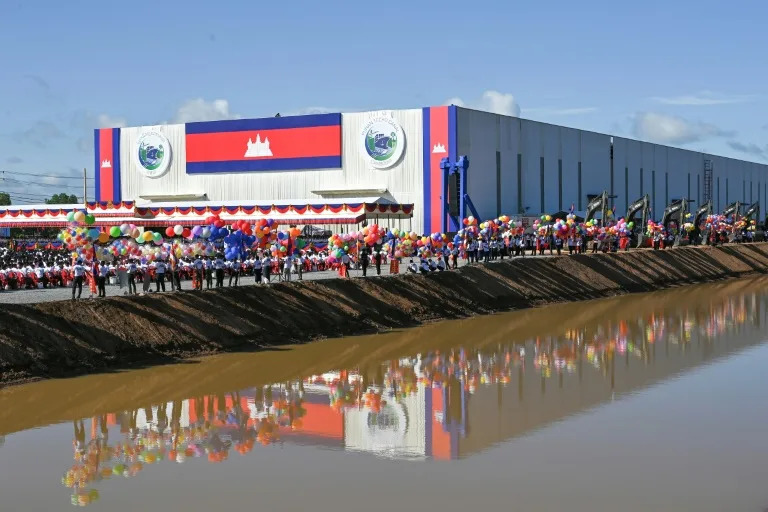
People attend the ground breaking ceremony of the Funan Techo Canal in Kandal province in Cambodia (TANG CHHIN Sothy)
Cambodia's Prime Minister Hun Manet on Monday launched a controversial $1.7 billion canal project that aims to provide a new link from the Mekong River to the sea.
Manet called the 180-kilometre (110-mile) project "historic" and vowed to "finish it at all costs".
"We must build this canal at all costs," Manet said at the project's launch ceremony before fireworks shot into the air and drums sounded after he pressed the launch button for the project.
The Funan Techo canal will run from the Mekong river, about an hour's drive southeast of Phnom Penh, to the sea in the Gulf of Thailand.
The government says the canal will offer an alternative to transit via Vietnam and will reduce dependence on Vietnamese ports, generating economic activity worth 21-30 percent more than its cost.
It would create tens of thousands of jobs in the country, which is among the poorest in Southeast Asia, though it has not provided detailed evidence for those forecasts.
suy/srg/fox
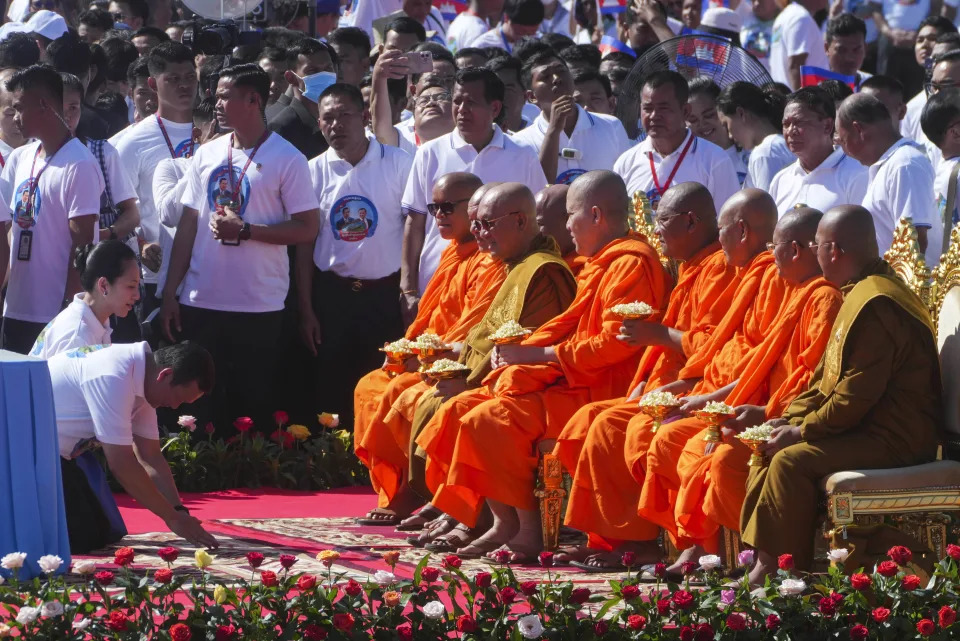
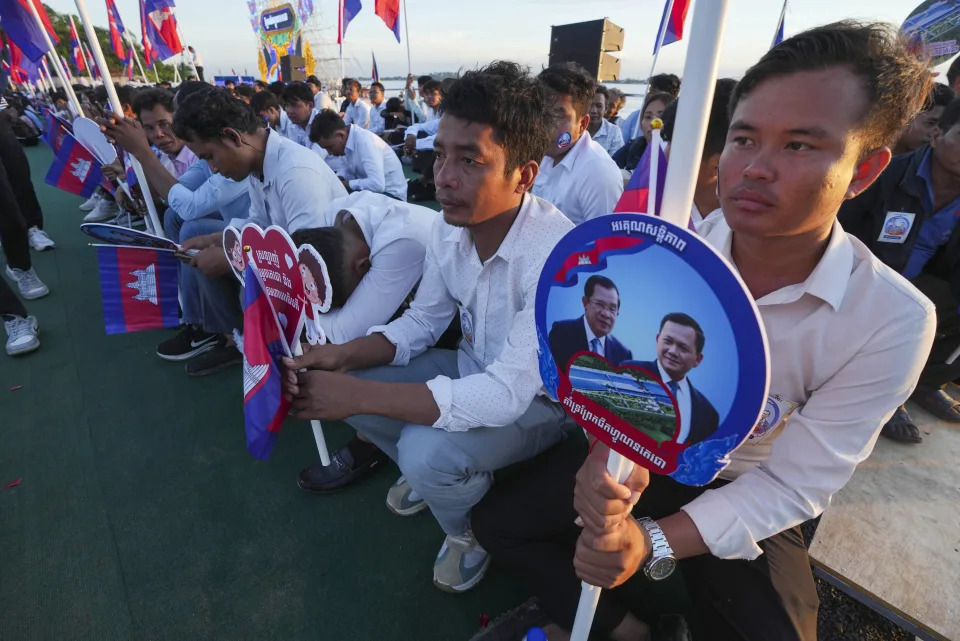

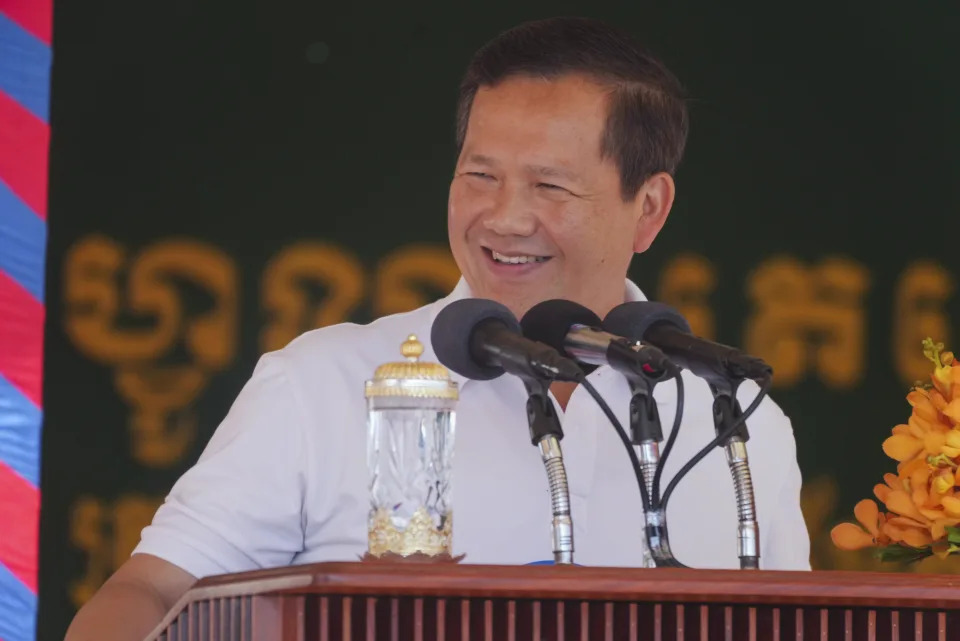

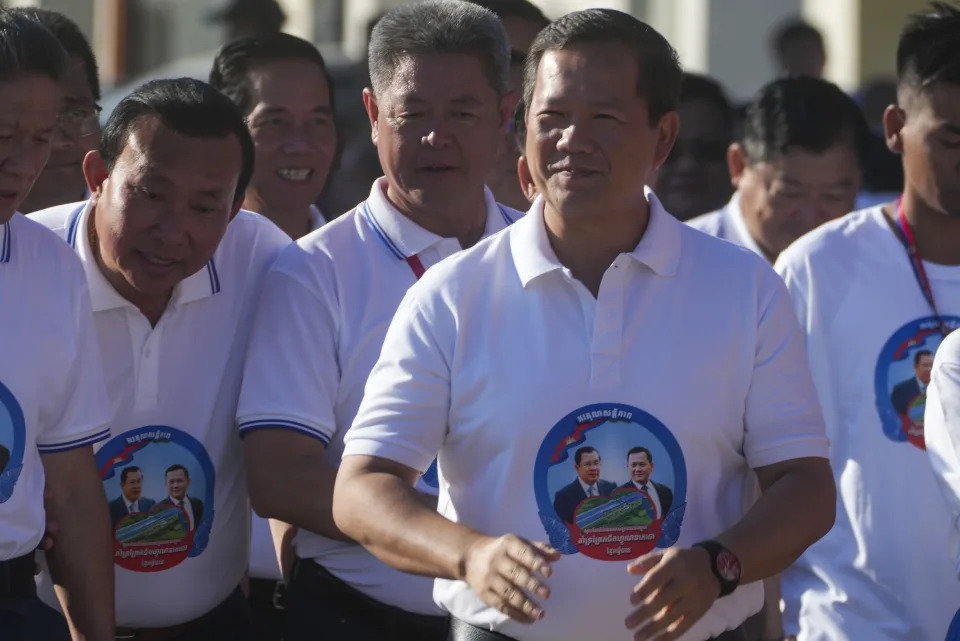

Cambodian Prime Minister Hun Manet, front left, accompanied by his wife Pich Chanmony, presses the button during a groundbreaking ceremony of China-funded Funan Techo canal that will connect the country’s capital Phnom Penh with Kep province on the country's south coast, Prek Takeo village, Kendal province, Cambodia, Monday, Aug. 5, 2024. (AP Photo/Heng Sinith)
ASSOCIATED PRESSMore
SOPHENG CHEANG and ANIRUDDHA GHOSAL
Mon, August 5, 2024

PREK TAKEO, Cambodia (AP) — Cambodia broke ground Monday on a controversial, China-funded canal to link the capital Phnom Penh to the sea, despite environmental concerns and the risk of straining ties with neighboring Vietnam.
The $1.7 billion, 180-kilometer (111 miles) Funan Techo canal is planned to connect the country’s capital with Kep province on Cambodia’s south coast, giving it access to the Gulf of Thailand. Cambodia hopes the 100-meter (328 feet)-wide, 5.4-meter (17.7 feet)-deep canal will lower the cost of shipping goods to the country's sole deep-sea port, Sihanoukville, and reduce reliance on Vietnamese ports.
The project highlights the outsized role that China plays in Cambodian politics and economy. Meanwhile, concerns remain about the potential environmental impacts of the canal, especially on the flow of the Mekong River, which feeds millions of people across six countries through its fish and the agriculture that it sustains.
The project has Vietnam worried, both about the effect on its Mekong Delta rice-growing and about Cambodia moving out of its orbit, said Nguyen Khac Giang, an analyst at Singapore’s ISEAS-Yusof Ishak Institute.
“There is a concern that most of the Cambodian exports might be diverted from the current route, crossing the Vietnamese border to Vietnamese ports and moving away from that to Cambodian ports,” he said.
But Hanoi has expressed its concerns quietly, if at all, Giang said. Given the "complex historical legacy" between Cambodia and Vietnam — despite strong bilateral ties, the two nations have a contentious relationship — Vietnam is reticent to openly criticize Cambodia lest it be seen as impinging on its neighbor's sovereignty, he said.
Analysts say that the infrastructure project is in part an effort by Cambodia’s ruling elite to invigorate support for Hun Manet, who last year took over the wheel of government from his father, Hun Sen, who led Cambodia for 38 years.
The government declared Monday — also Hun Sen’s birthday — a holiday so Cambodians could participate in the “celebration in a joyful, crowded and proud manner.” Thousands of people wearing t-shirts with photographs of the father and son began gathering at the canal site, that was covered in Cambodian flags. Billboards promoting the economic benefits of the canal dominated the countryside.
The canal will promote “national prestige, the territorial integrity and the development of Cambodia,” Manet said, adding that the country had built bigger and more expensive infrastructure projects before. But this “historic” canal was different and had nationwide support, he said.
“We will build this canal, no matter the cost,” he said.
He emphasized that while the canal would be jointly built by Chinese and Cambodian companies, the latter would have a 51% majority share and thus maintain control. Deputy Prime Minister Sun Chanthol confirmed that the Chinese state-owned construction giant China Road and Bridge Corporation had landed the contract to build the canal.
The U.S.-based nonprofit Stimson Center has warned that the canal would cause “significant transboundary impacts to water availability and agricultural production in Vietnam’s Mekong Delta.” The region is where 90% of rice exported from Vietnam is grown.
The Cambodian government has dismissed these concerns.
Earlier in April, Vietnam had asked Cambodia to share information about the canal. “We have asked Cambodia to collaborate closely with Vietnam and the Mekong River Commission in sharing information and assessing the project’s impacts on water resources and ecosystem in the Mekong Delta region."
Cambodia is a key Chinese diplomatic partner, helping dampen criticism of Beijing within the 10-member Association of Southeast Asian Nations, several of whose members, including Vietnam, are engaged in territorial disputes with China in the South China Sea.
China's outsized presence can be seen in the numerous Chinese-funded projects, hotels and casinos dotting the Cambodian landscape. China’s state banks have financed airports, roads and other infrastructure built with Chinese loans. Nearly 40% of Cambodia’s over $11 billion in foreign debt is owed to China.
In June 2022, China and Cambodia broke ground on a naval port expansion project that has raised concerns from the U.S. and others that it could give Beijing a strategically important military outpost on the Gulf of Thailand. Hun Sen in 2019 reportedly granted China the right to set up a military base at the Ream Naval Base. He has long denied that, saying Cambodia’s Constitution prohibits foreign military facilities.
Cambodia PM launches project linking Mekong river to sea via canal
The $1.7 billion, 180-kilometer (111 miles) Funan Techo canal is planned to connect the country’s capital with Kep province on Cambodia’s south coast, giving it access to the Gulf of Thailand. Cambodia hopes the 100-meter (328 feet)-wide, 5.4-meter (17.7 feet)-deep canal will lower the cost of shipping goods to the country's sole deep-sea port, Sihanoukville, and reduce reliance on Vietnamese ports.
The project highlights the outsized role that China plays in Cambodian politics and economy. Meanwhile, concerns remain about the potential environmental impacts of the canal, especially on the flow of the Mekong River, which feeds millions of people across six countries through its fish and the agriculture that it sustains.
The project has Vietnam worried, both about the effect on its Mekong Delta rice-growing and about Cambodia moving out of its orbit, said Nguyen Khac Giang, an analyst at Singapore’s ISEAS-Yusof Ishak Institute.
“There is a concern that most of the Cambodian exports might be diverted from the current route, crossing the Vietnamese border to Vietnamese ports and moving away from that to Cambodian ports,” he said.
But Hanoi has expressed its concerns quietly, if at all, Giang said. Given the "complex historical legacy" between Cambodia and Vietnam — despite strong bilateral ties, the two nations have a contentious relationship — Vietnam is reticent to openly criticize Cambodia lest it be seen as impinging on its neighbor's sovereignty, he said.
Analysts say that the infrastructure project is in part an effort by Cambodia’s ruling elite to invigorate support for Hun Manet, who last year took over the wheel of government from his father, Hun Sen, who led Cambodia for 38 years.
The government declared Monday — also Hun Sen’s birthday — a holiday so Cambodians could participate in the “celebration in a joyful, crowded and proud manner.” Thousands of people wearing t-shirts with photographs of the father and son began gathering at the canal site, that was covered in Cambodian flags. Billboards promoting the economic benefits of the canal dominated the countryside.
The canal will promote “national prestige, the territorial integrity and the development of Cambodia,” Manet said, adding that the country had built bigger and more expensive infrastructure projects before. But this “historic” canal was different and had nationwide support, he said.
“We will build this canal, no matter the cost,” he said.
He emphasized that while the canal would be jointly built by Chinese and Cambodian companies, the latter would have a 51% majority share and thus maintain control. Deputy Prime Minister Sun Chanthol confirmed that the Chinese state-owned construction giant China Road and Bridge Corporation had landed the contract to build the canal.
The U.S.-based nonprofit Stimson Center has warned that the canal would cause “significant transboundary impacts to water availability and agricultural production in Vietnam’s Mekong Delta.” The region is where 90% of rice exported from Vietnam is grown.
The Cambodian government has dismissed these concerns.
Earlier in April, Vietnam had asked Cambodia to share information about the canal. “We have asked Cambodia to collaborate closely with Vietnam and the Mekong River Commission in sharing information and assessing the project’s impacts on water resources and ecosystem in the Mekong Delta region."
Cambodia is a key Chinese diplomatic partner, helping dampen criticism of Beijing within the 10-member Association of Southeast Asian Nations, several of whose members, including Vietnam, are engaged in territorial disputes with China in the South China Sea.
China's outsized presence can be seen in the numerous Chinese-funded projects, hotels and casinos dotting the Cambodian landscape. China’s state banks have financed airports, roads and other infrastructure built with Chinese loans. Nearly 40% of Cambodia’s over $11 billion in foreign debt is owed to China.
In June 2022, China and Cambodia broke ground on a naval port expansion project that has raised concerns from the U.S. and others that it could give Beijing a strategically important military outpost on the Gulf of Thailand. Hun Sen in 2019 reportedly granted China the right to set up a military base at the Ream Naval Base. He has long denied that, saying Cambodia’s Constitution prohibits foreign military facilities.
Cambodia PM launches project linking Mekong river to sea via canal
AFP
Sun, August 4, 2024 a

People attend the ground breaking ceremony of the Funan Techo Canal in Kandal province in Cambodia (TANG CHHIN Sothy)
Cambodia's Prime Minister Hun Manet on Monday launched a controversial $1.7 billion canal project that aims to provide a new link from the Mekong River to the sea.
Manet called the 180-kilometre (110-mile) project "historic" and vowed to "finish it at all costs".
"We must build this canal at all costs," Manet said at the project's launch ceremony before fireworks shot into the air and drums sounded after he pressed the launch button for the project.
The Funan Techo canal will run from the Mekong river, about an hour's drive southeast of Phnom Penh, to the sea in the Gulf of Thailand.
The government says the canal will offer an alternative to transit via Vietnam and will reduce dependence on Vietnamese ports, generating economic activity worth 21-30 percent more than its cost.
It would create tens of thousands of jobs in the country, which is among the poorest in Southeast Asia, though it has not provided detailed evidence for those forecasts.
suy/srg/fox







Cambodian Prime Minister Hun Manet, front left, accompanied by his wife Pich Chanmony, presses the button during a groundbreaking ceremony of China-funded Funan Techo canal that will connect the country’s capital Phnom Penh with Kep province on the country's south coast, Prek Takeo village, Kendal province, Cambodia, Monday, Aug. 5, 2024. (AP Photo/Heng Sinith)
ASSOCIATED PRESSMore
No comments:
Post a Comment